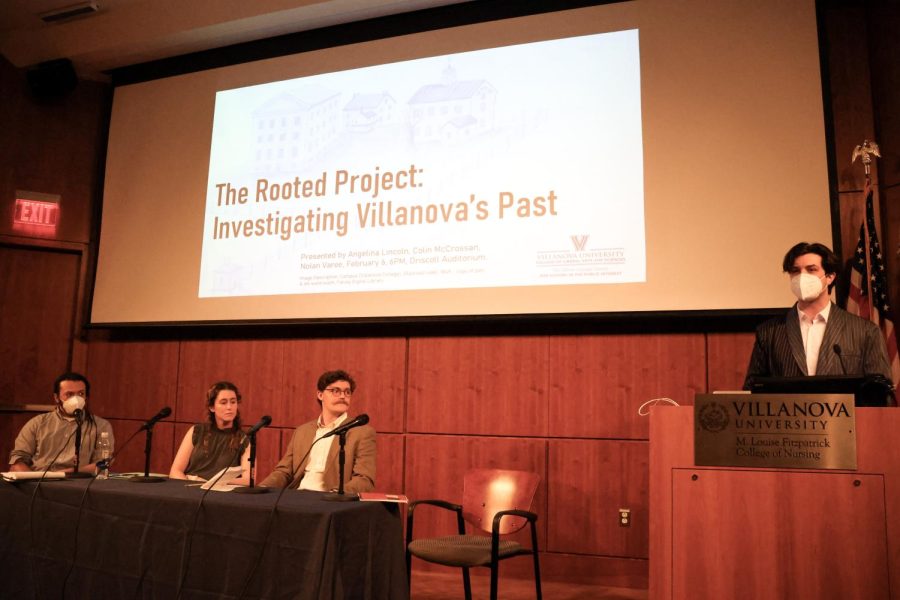The Rooted Project
Graydon Paul/ Villanovan Photography
The panel of speakers at the LePage Center’s event about the research of the Rooted Project.
February 15, 2023
On Monday, February 6th, a panel of graduate students represented the Rooted Project and explained the intentions of the project.
The Rooted Project aims to tell a “new history of Villanova University based in fact and aimed at justice,” as stated on the webpage www.rootedproject.org.
Colin McCrossan, a graduate student at Villanova, posed several different questions while re-examining the history of Villanova. The key finding that McCrossan highlighted was that Villanova is located on a site where enslavement occurred. The Morgan family, who were Welsh Quakers that lived on the land in which Villanova is on, owned at least three enslaved individuals. It was recorded that the names of those enslaved were Jack, Chloe and George.
This information was acquired from documents stating the purchase of each of these enslaved people and from documents listing what the Morgan family considered their “property” in their wills.
One of many inhumane truths of slavery is revealed in this will, which marks the value of Jack and Chloe’s lives. This dehumanizing practice valued these enslaved people as less than the total livestock owned by the Morgan family.
At a predominantly white university, it is important to recognize the black influence that exists on our campus. The Rooted Project explores the history of Villanova in a way that incorporates “the histories of slavery, segregation, institutionalized racism, and gender and religious prejudice,” as stated on the webpage.
Angelina Lincoln, a current graduate student at the University of Maryland, also presented her research at this panel. Her key finding was that William and Julia Moulden were co-founders of Villanova University, but their legacy has been forgotten and erased overtime. Lincoln aims to make our community aware of the significance this African-American couple had on our University’s history.
Lincoln hopes that her research will serve as an educational tool for the Villanova student body.
“Through the Rooted Project, I hope that William and Julia Moulden become more commonly known on campus as integral founders of and donors to Villanova,” she said. “I also hope that in learning about their lives, students are encouraged to think about and research other moments in Black history that aren’t fully acknowledged and understood on campus and in their local areas.”
Lincoln’s research emphasizes that Villanova University would not be where it is today without the Moulden family. The Mouldens directly contributed to the growth of this institution, and it is crucial to include those narratives in our University’s history.
During the Q&A, Nolan Varee, another member of this panel, provided his thoughts.
“Students should be aware of this history,” Varee said. “Our goal is to bring this to students and discover what this means to students.”
Kevin Fox, the administrator for the Lepage Center, also shared his perspective on the importance of the Rooted Project.
“To me, the Rooted Project is about critically engaging with the history of this University that we all call home, and using that additional knowledge and perspective to inform not just how we think and talk about the school, but how we act here, how we think and talk about race, gender, labor, and property throughout the country,” he said. “And, further, what we do with that knowledge to create a more equitable learning environment and a better world.”
The Rooted Project is attempting to start a dialogue with the goal of enacting change. If you are a Villanova student seeking to further educate yourself on the history of this University, please consider visiting www.rootedproject.org.











